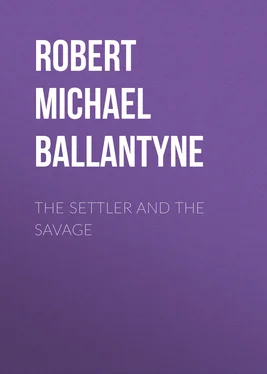Robert Michael Ballantyne - The Settler and the Savage
Здесь есть возможность читать онлайн «Robert Michael Ballantyne - The Settler and the Savage» — ознакомительный отрывок электронной книги совершенно бесплатно, а после прочтения отрывка купить полную версию. В некоторых случаях можно слушать аудио, скачать через торрент в формате fb2 и присутствует краткое содержание. Жанр: Детские приключения, literature_19, foreign_antique, foreign_prose, foreign_children, на английском языке. Описание произведения, (предисловие) а так же отзывы посетителей доступны на портале библиотеки ЛибКат.
- Название:The Settler and the Savage
- Автор:
- Жанр:
- Год:неизвестен
- ISBN:нет данных
- Рейтинг книги:4 / 5. Голосов: 1
-
Избранное:Добавить в избранное
- Отзывы:
-
Ваша оценка:
- 80
- 1
- 2
- 3
- 4
- 5
The Settler and the Savage: краткое содержание, описание и аннотация
Предлагаем к чтению аннотацию, описание, краткое содержание или предисловие (зависит от того, что написал сам автор книги «The Settler and the Savage»). Если вы не нашли необходимую информацию о книге — напишите в комментариях, мы постараемся отыскать её.
The Settler and the Savage — читать онлайн ознакомительный отрывок
Ниже представлен текст книги, разбитый по страницам. Система сохранения места последней прочитанной страницы, позволяет с удобством читать онлайн бесплатно книгу «The Settler and the Savage», без необходимости каждый раз заново искать на чём Вы остановились. Поставьте закладку, и сможете в любой момент перейти на страницу, на которой закончили чтение.
Интервал:
Закладка:
“It may be so, Mr McTavish,” replied Sandy, in a doubtful tone of voice, “it may be so.”
“Hallo!” suddenly and loudly exclaimed a dapper little man, whose voice betokened him English.
“What is’t, Jerry?” demanded Sandy Black, turning his eyes seaward, in which direction Jerry was gazing.
The question needed no reply, for Sandy, and indeed all the various people in the barge who stood high enough on its sides or lading to be able to look over the gunwale, observed a mighty wave coming up behind them like a green wall.
“Haul hard!” roared the seamen in charge.
“Ay, ay,” shouted the soldiers on shore.
As they spoke the billow lifted the boat as if it had been a cork, fell under it with a deafening roar and bore it shoreward in a tumult of seething foam. Next moment the wave let it down with a crash and retired, leaving it still, however, in two or three feet of water.
“Eh, man, but that was a dunt!” exclaimed Sandy, tightening his hold on the gunwale, while several of his less cautious or less powerful neighbours were sent sprawling into the bottom of the boat among terrified women and children.
All was now bustle and tenfold excitement, for the soldiers on the beach hurried waist-deep into the sea for the purpose of carrying the future settlers on shore.
Thomas Pringle, the leader of the Scotch party, and who afterwards became known as the “South African poet” had previously landed in a gig. He gave an opportune hint, in broad Scotch, to a tall corporal of the 72nd Highlanders to be careful of his countrymen.
“Scotch folk, are they?” exclaimed the corporal, with a look of surprise at Pringle. “Never fear, sir, but we sal be carefu’ o’ them .”
The corporal was as good as his word, for he and his comrades carried nearly the whole party ashore in safety. But there were others there who owned no allegiance to the corporal. One of these—a big sallow Hottentot—chanced to get Jerry, surnamed Goldboy, on his shoulders, and, either by mischance or design, stumbled and fell, pitching Jerry over his head, just as another billow from the Indian Ocean was rushing to the termination of its grand career. It caught Jerry up in a loving embrace as he rose, and pitched him with a noisy welcome on the shore.
“Weel done, Jerry!” cried Sandy Black, who had just been overturned by the same wave from the shoulders of a burly Englishman—a previously landed settler—“you an’ me’s made an impressive landin’. Come, let’s git oot o’ the bustle.”
So saying the stout Lowlander seized his little English friend by the arm and dragged him towards the town of canvas which had within a few weeks sprung up like mushrooms among the sandhills.
Although wet from head to foot, each forgot his condition in the interest awakened by the strange sights and sounds around him. Their immediate neighbourhood on the beach was crowded with emigrants, as party after party was carried ashore shoulder-high by the soldiers, who seemed to regard the whole affair as a huge practical joke.
The noise was indescribable, because compound. There was the boisterous hilarity of people who felt their feet once more on solid ground, after a long and weary voyage; the shouting of sailors and bargemen in the boats, and of soldiers and natives on the beach; the talking and laughing of men and women who had struck up sudden friendships on landing, as well as of those who had crossed the sea together; the gambolling and the shrieking delight of children freed from the restraints of shipboard; the shouts of indignant Government officials who could not get their orders attended to; the querulous demands of people whose luggage had gone astray in process of debarkation; the bawling of colonial Dutch by gigantic Dutch-African farmers, in broad-brimmed hats and leathern crackers, with big tobacco-pipes in their mouths; the bellowing of oxen in reply to the pistol-shot cuts applied to their flanks by half-naked Hottentots and Bushmen, whose whips were bamboos of twenty feet or so in length, with lashes twice as long; the creaking of Cape-waggons, the barking of dogs, and, as a measured accompaniment to all, the solemn regular booming of the restless sea.
Disengaging themselves from the crowded beach, Sandy Black and Jerry Goldboy proceeded towards the town of tents among the sandhills. On their way they passed several large tarpaulin-covered depots of agricultural implements, carpenter’s and blacksmith’s tools, and ironware of all descriptions, which had been provided by Government to be sold to the settlers at prime cost—for this grand effort at colonisation was originated and fostered by the British Government.
“Weel, weel, did ever ’ee see the like o’ that, noo?” observed Sandy Black, as he passed some sandhills covered with aloes and cactuses and rare exotics, such as one might expect to find in English greenhouses.
“Well, yes,” replied Jerry Goldboy, “them are hodd lookin’ wegitables. I can’t say that I’ve much knowledge of such-like myself, ’avin’ bin born an’ bred in London, as I’ve often told you, but they do seem pecooliar, even to me.—I say, look ’ere; I thought all the people ’ere was settlers.”
Sandy, who was a grave man of few words, though not without a touch of sly humour, replied, “Weel, so they are—an’ what than?”
“Why, w’at are them there?” demanded Jerry, pointing to several marquees pitched apart among some evergreen bushes.
“H’m! ’ee may ask that,” replied the Scot; but as he did not add more, his companion was content to regard his words as a confession of ignorance, and passed on with the remark, “haristocrats.”
Jerry was so far right. The marquees referred to belonged to the higher class of settlers, who had resolved to forsake their native land and introduce refinement into the South African wilds. The position chosen by them on which to pitch their tents, and the neatness of everything around, evinced their taste, while one or two handsome carriages standing close by betokened wealth. Some of the occupants, elegantly dressed, were seated in camp-chairs, with books in their hands, while others were rambling among the shrubbery on the little eminences and looking down on the bustling beach and bay. The tents of these, however, formed an insignificant proportion of the canvas town in which Sandy Black and his friend soon found themselves involved.
“Settlers’ Camp,” as it was called, consisted of several hundred tents, pitched in parallel rows or streets, and was occupied by the middle and lower class of settlers—a motley crew, truly. There were jolly farmers and pale-visaged tradesmen from various parts of England, watermen from the Thames, fishermen from the seaports, artisans from town and country, agricultural labourers from everywhere, and ne’er-do-weels from nowhere in particular. England, Scotland, Ireland, were represented—in some cases misrepresented,—and, as character was varied, the expression of it produced infinite variety. Although the British Government had professedly favoured a select four thousand out of the luckless ninety thousand who had offered themselves for emigration, it is to be feared that either the selection had not been carefully made, or drunkenness and riotous conduct had been surprisingly developed on the voyage out. Charity, however, requires us to hope that much of the excitement displayed was due to the prospect of being speedily planted in rural felicity in the wilds of Africa. Conversation, at all events, ran largely on this theme, as our wanderers could easily distinguish—for people talked loudly, and all tent-doors were wide open.
After wandering for some time, Sandy Black paused, and looking down at his little friend with what may be called a grave smile, gave it as his opinion that they had got lost “in Settlers’-toon.”
Читать дальшеИнтервал:
Закладка:
Похожие книги на «The Settler and the Savage»
Представляем Вашему вниманию похожие книги на «The Settler and the Savage» списком для выбора. Мы отобрали схожую по названию и смыслу литературу в надежде предоставить читателям больше вариантов отыскать новые, интересные, ещё непрочитанные произведения.
Обсуждение, отзывы о книге «The Settler and the Savage» и просто собственные мнения читателей. Оставьте ваши комментарии, напишите, что Вы думаете о произведении, его смысле или главных героях. Укажите что конкретно понравилось, а что нет, и почему Вы так считаете.












